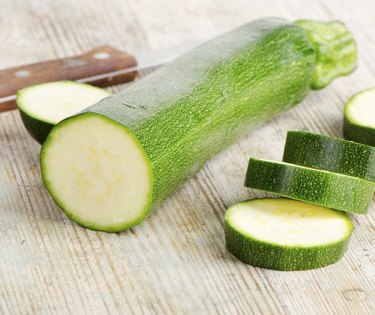
Coumadin, also known as warfarin, is a blood thinner used to reduce blood clot formation and prevent blocked arteries, heart attacks and strokes. Many foods are safe to eat while taking Coumadin, but some can affect how well your Coumadin works.
Video of the Day
Video of the Day
Vitamin K acts as a natural blood-clotting agent within the body and can therefore interact with Coumadin and make it less effective. While taking Coumadin, it's necessary to consume consistent amounts of vitamin K in your diet. The daily adequate intake of vitamin K for adult males is 120 micrograms per day; for adult females, it's 90 micrograms per day, according to the Institute of Medicine.
Read more: Diet for People on Warfarin
Low Vitamin K Veggies
Vegetables are rich in many nutrients, including vitamin K. Leafy and green vegetables, such as broccoli, cabbage, spinach, Brussels sprouts, collards and kale, are especially good sources of vitamin K. This doesn't mean that you have to avoid these vegetables, however; you simply need to consume approximately the same amount each day.
You can also choose from low vitamin K vegetables such as carrots, potatoes, celery, peas, peeled cucumbers, peppers, eggplant, tomatoes and zucchini. On average, you should eat two to four servings of vegetables per day, with a serving equal to 1 cup of raw vegetables or 1/2 cup of cooked vegetables.
Pack in Nutrition With Fruit
Fruit is an excellent source of antioxidants, vitamins, minerals and fiber and contains low levels of vitamin K so you can eat it freely. Good fruit choices include oranges, kiwifruits, grapes, bananas, prunes, cranberry juice, melon, plums, raisins, fruit cocktail, blueberries and applesauce.
A serving is equal to one medium piece of fruit; 1/2 cup of canned, frozen or cut-up fresh fruit; 1/3 cup of dried fruit; or 4 ounces of fruit juice. On average, you should eat two to four servings of fruit per day.
Dairy Foods for Calcium and Protein
Dairy products are low in vitamin K and are acceptable on a Coumadin diet. Milk, cheese, cream, yogurt and ice cream are examples of dairy products you may consume. Eat two to three 1-cup servings of dairy each day.
While all of these foods are considered safe while you're taking Coumadin, it's best to consume low-fat or nonfat dairy products when possible. This will help you maintain a healthy weight and prevent other complications.
Meat, Poultry and Fish
Chicken, turkey, duck, beef, steak, veal, ham and pork are acceptable when taking Coumadin, except for beef and chicken livers, which are rich in vitamin K. Avoid high-fat selections, such as sausage, bacon and bologna when possible.
Fish such as haddock, salmon, trout, mackerel, tuna and shellfish, including clams, oysters and shrimp are also good choices. Fish is especially beneficial as it's high in the essential fatty acid omega-3. You may also eat eggs, but only in moderation as they're high in cholesterol. On average, you should eat three servings of high-protein foods each day.
Nutrient-Rich Starches and Grains
Most breads, cereals and grains are low in vitamin K. You should eat six to eight servings of food from this group daily, choosing whole grains when possible. Good examples of acceptable foods from the starch and grain group include oatmeal, wheat bread and pasta, brown rice, quinoa, millet, couscous, cream of wheat, cereal grains, rye and granola.
- Food and Nutrition Board, Institute of Medicine, National Academies: Recommended Dietary Allowances and Adequate Intakes, Vitamins
- Healthline: 20 Foods High in Vitamin K
- HealthLinkBC: Vitamin K and Warfarin
- Nutrition Institute of Health: Coumadin and Vitamin K
- Cleveland Clinic: Understanding Coumadin
Is this an emergency? If you are experiencing serious medical symptoms, please see the National Library of Medicine’s list of signs you need emergency medical attention or call 911.